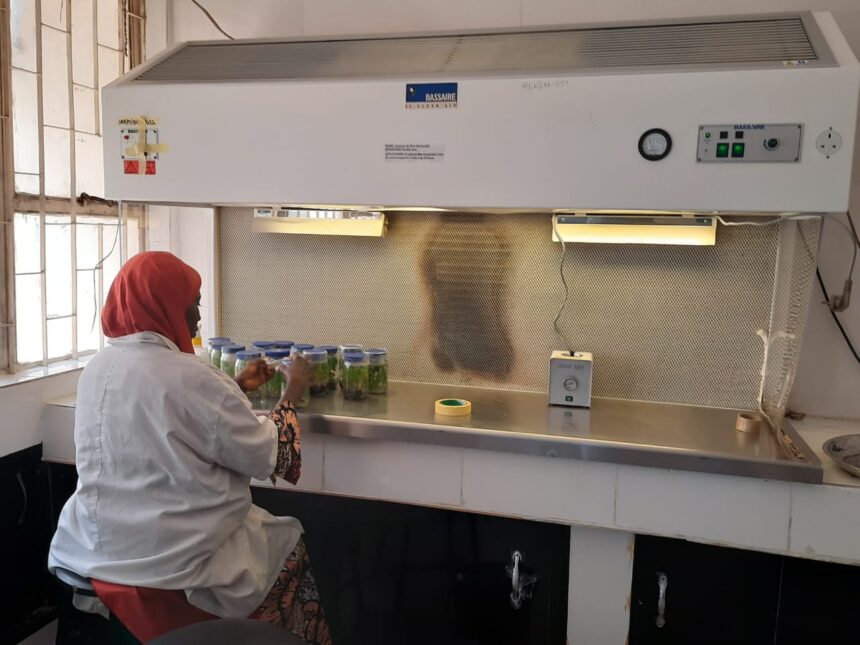Says GM crops reduce greenhouse gas emissions, increase soil quality
The Biotechnology Society of Nigeria (BSN) has said the introduction of GM crops has given farmers in Nigeria the opportunity to earn more and live healthier lives.
In a detailed response contained in a memo addressed to House of Representatives Committee on Agricultural Production and Services sequel to the recent public investigative hearing by the House of Representatives on the Introduction of GM crops in Nigeria, BSN, the umbrella body for scientists interested in biotechnology, especially modern biotechnology, stated that the widespread adoption of GM crops and the agricultural practices associated with their use have resulted in reductions in herbicide and insecticide volumes thus reducing the cost of farming and making farmers richer and healthier.
The memo signed by its National President, Prof. Sylvia Uzochukwu, biosafety and food safety expert, the Society which comprises of University Professors and Scientists, graduate research students, and other scientists and biotechnology stakeholders, disclosed that, as far they have probed, all the GM crops introduced in Nigeria were subjected to sufficient biosafety tests and evaluations prior to their commercialization.
During the Investigative Hearing on the Introduction of GM Crops in Nigeria, held on the 19th of November 2024, series of issues were raised by the horde of voices of activists against GM, especially on safety to humans and biodiversity.
Dispelling the claim that it causes cancer, sterility and Environmental degradation, the society stated that, “According to Cancer Research, UK (CRUK), the world’s largest independent cancer research organization, there is no evidence that eating genetically modified foods causes cancer in humans,” adding that there are no cogent explanations from those making the claims, to show how GM foods could cause cancer.
Citing references from the organization, the society noted that GM foods are stringently regulated and cannot be sold or used commercially until they are certified safe by the competent authority.
On environmental effects, BSN noted that, “When examining the global environmental impact of GM crops, research clearly indicates that GM crops have no degrading effect on the environment. On the contrary, on a global scale, GM crops have actually had a positive impact on the environment.”
They also noted that reduction in fuel use associated with GM crops has led to a significant reduction of greenhouse gas emissions and a concomitant increase in soil quality.
“The reduction in pesticide use improves the health and lifespan of farmers and their families. It also reduces chemical runoff into the soil, surface water, ground water and the air, thereby improving the health of humans and conserving biodiversity,” the society noted in the memo.
Giving further clarifications, the society stated that the positive environmental impacts and increased crop yields associated with GM crops validate the use of this technology in the development of a sustainable food system in Nigeria.
On claims that consumption of GM crops causes sterility, the BSN stated in the memo dated November 28, 2024 that “there is no evidence anywhere that GM foods cause sterility.”
Citing a previous letter written to the leadership of the Nigerian Senate, the society slammed the author for attempting to play on people’s ignorance on modern biotechnology to propagate unfounded claims.
“In a letter written to the leadership of the Nigerian Senate a while ago, the author stated that certain GM foods like corn, “allegedly contain an epicyte gene linked to sterilization” and he gives a link to a 2013 article by anti GM writers, that does not mention the said epicyte gene, as his authority. He has no source to back his allegation and he seeks to mislead by deliberately providing a link that does not address the issue raised.
“There is no gene called the epicyte gene. Epicyte bio-lab is the name of a biotechnology company in San Diego that in 2001, announced they had created a —’contraceptive corn’—after researchers discovered a rare class of human antibodies that make sperm sluggish. Shortly after the 2001 Epicyte press release, all discussion of the breakthrough vanished. Nothing more was heard in any media about the development of the spermicidal corn, and the company no longer exists. So, what this writer was referring to, is something that was mentioned more than 20 years ago, was abandoned, and no longer exists. No GM seed contains any “epicyte” or sterilization gene. It is all sensationalism.”
The society also noted that Nigeria is not lacking in capacity to regulate modern biotechnology, adding that there are well trained competent Nigerians who can independently assess safety of any new product.
In this regard, BSN also noted that the National Biotechnology Management Agency (NBMA) has well equipped laboratories for safety assessment of GM products.
The body of scientists stated that the controversy surrounding GM crops introduction in Nigeria is a call for more investment in research and technology uptake.
“Nigeria needs to take ownership of these emerging technologies, by funding science and technology massively and with sincerity. No Nation develops on donor funds,” BSN noted in the memo addressed to the Chairman, House of Representatives Committee on Agricultural Production and Services.
The society also responded to claims that Genetically Modified Food is fraud, and that they contain population control factors thus: “Genetically Modified Food is not fraud. The US has consumed them for nearly 30 years without issues. They hold the key to food security for Nigeria, and the government of Nigeria has started on a very strong footing.
“There are no bacteria inside GM foods. In any case, we eat food full of bacteria every day, such as iru, ogiri, dawadawa, okpehe, ugba. They are fermented by Bacillus bacteria, the same type from which we take a little DNA to make plants insect resistant. The bacterium is not inserted into the plant, but in the case of the traditional fermented foods, we eat them with all the bacteria that fermented them, and see nothing wrong. In the case of GM foods, it is just a small piece of DNA. There is no entity in GM foods that explodes and no population control factor is therein. Anyone who says such outlandish things should provide proof.”
On claims of a link between emerging diseases in Nigeria and GMOs, the society responded thus: “No such link has been established by anyone anywhere in the world. It would be interesting to see the peer-reviewed studies from which this conclusion was drawn. The statement has no basis.”
Concluding, the memo read: “GM foods approved for commercialisation in Nigeria have been assessed for safety at many levels and are safe for human health and for the environment. The products are important for food security, farmers’ health and environmental safety. Their use should be encouraged by all who wish the country well.”





